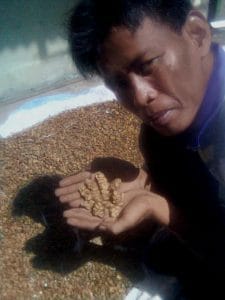 A civet is a small, lithe-bodied, mostly nocturnal mammal native to tropical Asia and Africa, especially the tropical forests. The term civet applies to over a dozen different mammal species. Most of the species diversity is found in southeast Asia. The best-known civet species is the African Civet, Civettictis civetta, which historically has been the main species from which was obtained a musky scent used in perfumery.
A civet is a small, lithe-bodied, mostly nocturnal mammal native to tropical Asia and Africa, especially the tropical forests. The term civet applies to over a dozen different mammal species. Most of the species diversity is found in southeast Asia. The best-known civet species is the African Civet, Civettictis civetta, which historically has been the main species from which was obtained a musky scent used in perfumery.
The Asian palm civet (Paradoxurus hermaphroditus), also called toddy cat, is a small member of the Viverridae family native to South and Southeast Asia. In 2008, the IUCN classified the species as Least Concern as it is tolerant of a broad range of habitats, is widely distributed with large populations that are unlikely to be declining.
 Civets living near coffee plantations eat the coffee cherry. Their digestive system only break down the flesh around the coffee pits, leaving the beans intact. During digestion, however, the beans are processed and they change properties. The defecated beans are then collected by workers cleaned up and processed.
Civets living near coffee plantations eat the coffee cherry. Their digestive system only break down the flesh around the coffee pits, leaving the beans intact. During digestion, however, the beans are processed and they change properties. The defecated beans are then collected by workers cleaned up and processed.
Coffee collected from civet’s feces is called Kopi Luwak, and is one of the most expensive coffees in the world. It’s been reported as milder tasting than regular coffee, while retaining the flavor.